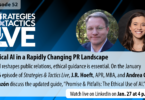In today’s “post-truth” environment — where misinformation spreads at lightning speed and AI blurs the line between fact and fiction — ethical decision-making has never been more essential for communicators.
As part of PRSA’s annual Ethics Month, the Sept. 10 webinar “Navigating Ethical PR in a Post-Truth World” will tackle this challenge head-on. Led by Samantha Villegas, APR, Fellow PRSA, an award-winning communications and outreach executive, the session will explore practical ways PR pros can safeguard integrity and public trust.
PRsay spoke with Villegas about why ethics must be a daily practice, not just a talking point.
You’ve served as an ethics officer for the National Capital Chapter. What drives your passion for this work, and why is the topic of ethics so personally meaningful to you?
I believe that strategic communications — and the trusting relationships that are built as a result of them — is the most powerful tool we have, not just in business, but in all aspects of our lives.
Unethical behavior diminishes that power for all of us because it calls into question everyone’s motives and their sense of what and who is being fair or true. The consequences of unethical behavior are incredibly costly to us all — literally and figuratively.
Can you provide a brief overview of the webinar?
The session was designed with the PRSA Code of Ethics as the backbone — but I didn’t want to be literal about it. I wanted to frame the session in real terms, so we’re going to talk about today’s business and political environment and how it intersects with AI and mis- and disinformation to connect participants’ real-world experiences to the Code. Then we’ll talk about how our specialized expertise and independence are essential for ethical decision-making and counsel.
You mention AI and digital transformation and their impacts on the profession, not to mention our daily lives. How will this webinar help professionals stay ahead of new ethical challenges?
The webinar will be highly focused on helping participants recognize a shaky ethics scenario before it takes place or creates consequences, and also equip them with the knowledge, scripts, or solutions they can employ to redirect efforts. So, whether it’s AI, or new leadership, or market changes — whatever the ethical challenge, they will come away knowing how to prevent it or address it.
How can PR professionals integrate ethics into their daily routines beyond just recognizing it in September during PRSA’s annual Ethics Month?
I am struck by the question because there are ethical implications to almost every action we take and decision we make. The idea that a PR practitioner would only think of ethics in September, when PRSA promotes it, is nutty to me. Ethics should be considered with every piece of advice we give, every challenge we meet, every plan we write, every message or material we create, and so on.
If it’s not, then we’re all doing this wrong. So, we’ll talk about how professionals can prompt themselves in every moment. Is this ethical? How can I be sure? I’ll encourage participants to develop their own personal ethics action plan.
What does a personal ethics action plan entail?
Realizing everyone has different needs and works in very different environments, the personal action plan is a way for communicators to truly personalize how they will incorporate the Code of Ethics into their daily behavior. Maybe it’s an ethics vision board. Maybe it’s a daily reminder they set in Outlook. Maybe it’s a checklist that’s written to start, but becomes memorized over time with use.
What is one main takeaway you want every participant to leave with — something they can start using right away?
It’s my hope that they come away with how to develop a proactive plan to recognize ethics breaches and address them before they happen.
John Elsasser is PRSA’s publications director and host of Strategies & Tactics Live on LinkedIn.
Illustration credit: thiago







